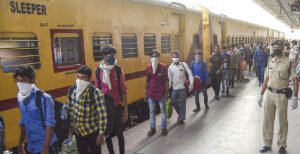 The Covid-19 pandemic has taken the entire world under threat by surprise. It has created a threat to human life as no vaccine or medicine has so far been invented to control it. In order to contain the spread of this virus, the governments have accepted the guidelines of the World Health Organization (WHO) to create social physical) distancing within their territories. The infected persons are isolated from the rest of the population, and patients for a specified period of two weeks.
The Covid-19 pandemic has taken the entire world under threat by surprise. It has created a threat to human life as no vaccine or medicine has so far been invented to control it. In order to contain the spread of this virus, the governments have accepted the guidelines of the World Health Organization (WHO) to create social physical) distancing within their territories. The infected persons are isolated from the rest of the population, and patients for a specified period of two weeks.
Lockdown has been adopted as a model of social distancing. The citizens are asked to stay in their homes during the lockdown period. Except for essential services like health, supply of milk, vegetables, fruits, items of daily use, medicines or ICT services, every other economic and social activity is closed. The supply of essential services is allowed through authorized persons or pass-holders in curfew bound areas and by the shopkeepers and suppliers in non-curfew areas. All the institutions such as schools, colleges, universities, shops, market places, dhabas, restaurants, factories, construction activities, transport, cinema halls, etc. are closed. Advisories have been issued to be followed even in social ceremonies related to marriages and deaths.
Borders of nations are closed to citizens of other countries. Within India, state boundaries have been sealed to stop the mixing of infected persons from outside states. The identified infected persons are put on quarantine for two weeks, while serious patients are admitted to the hospitals. All these measures have hit the economy very hard due to closure of a large number of economic activities. As yet no systematic estimates are available about the total economic loss during the lockdown and curfew period in any country including India.
Various international organizations like the World Bank, IMF, and other rating agencies have been projecting negative or zero growth of various countries. Although various agencies differ in their projections, they also point out towards substantial negative impact on various economies. The exact impact on each economy will depend on the period of lockdown and subsequently on the amount of revival package administered by the government.
Role of the Nation State
The experience of managing the Covid-19 crisis in India brings out that it has been largely the affair of the union and state governments. Managing social distances, sealing of borders with other countries, other states, and districts, issue of passes, identification of infected persons or patients, keeping suspected infected persons in quarantine, admission of patients in the hospitals have been the task of the police and civil administration and medical services in the public sector. The private clinics, hospitals and five-star private hospitals closed their establishments due to the fear of Covid-19.
The task of feeding the poor or whose livelihood was lost was initially undertaken by the civil society and religious organizations, but later on this had to be undertaken by the government agencies through the Red Cross. This became necessary because the volunteers of civil society or religious organizations were not able to follow norms of social distancing. At several places, the police and local administration of village Panchayats/local urban bodies were engaged in distribution of free ration to the poor and needy households.
Most of the employers refused to pay their workers during the lock-down period. In spite of the appeal of the Prime Minister, not to remove any one from employment, many companies and employers resorted to lay off or termination of services of some of their employees. This includes some airlines, media, both electronic and print, to mention a few. Without going into further details, it can be stated that it is public sector and government employees who received their assured income. The employees and workers in the corporate sector and informal sector faced unemployment and loss of income. The experience shows that in emergencies like Covid-19, the public sector and government is the bulwark against them.
It is also noted that it is the only concern of the nation state to protect its citizens. The global cooperation appears to be missing with sealing of national boundaries. This also led to cancellation of international flights, and export orders of companies were not complied due to threat of Covid-19 infection. The experience brings home an important lesson.
In case of pandemic like Covid-19, it is the Nation State, which has to bear the brunt. As the uncertainty of the present situation is likely to continue for some time and also the world may experience new such challenges in the future, the Nation State must be sufficiently strengthened and put in the center stage.
The way the Nation State’s role was reduced after 1991, when the policy of liberalization, privatization and globalization was adopted, it has been sufficiently weakened. A large role was provided to market forces in areas earlier reserved for the public sector and governments.
States exposed
The private sector flourished at the cost of the state sector reducing the capacity of the latter to act in the hour of crisis. The weakness of the state to protect the health, employment and livelihood of its citizens was exposed in the present crisis. In the light of present experience the terms of discourse needs to be changed in favour of state of the government administration. This can be done by bringing the state in the center stage. In view of refusal to perform under the Covid-19 threat, the Government of Spain nationalised the private healthcare facilities.
The closure of boundaries by advanced countries point out the greater responsibilities of national governments to the life, health and jobs of the citizens. In the present circumstances, the private sector has to be regulated in terms of wage rate and salaries, conditions of work especially maintaining social distances during work, retirement benefits to workers or employees and other social security measures. At the same time, natural resources and the ecological environment have to be saved from the greed of bigger and smaller players in the private sector.
This has been brought out by Karl Polanyi in his book, The Great Transformation, which was first published in 1944 and reprinted in 2001. It is stated that the self regulating market or economy dominated by the free market brought miseries for the people of Europe in the form of massive unemployment, large inequality in distribution of income and wealth, poverty and destruction of community life during 1870s and 1880s. This created an urgency to replace the laissez faire policy by dominance of the state and regulation of the operation of private sector enterprises. Polanyi believes that industrial society will exist and sustain without self regulating market mechanisms.
The state has to regulate the labour market, especially the wage rate and salaries, condition of work and social security of workers or employees. Similarly on land and natural resources, the market mechanism cannot be allowed a free role. Unchecked market forces destroy the nature and natural environment and consequently the sustainability of life is threatened. At the same time, the currency and financial markets cannot be allowed to play havoc with the lives of the people. The regulation of the private sector is of utmost importance, and dominance of the public sector allows making effective regulation of private enterprises. This enables the state to protect the health of the people, save their employment and ensure their social security. The existence of these three things makes people of the country confident and creative. The need for a strong public sector in health, education and social infrastructure has been brought out by the Covid-19 situation in the country.
The positives
The period of extended lockdown has improved the quality of air, water in the rivers and fresh water bodies. This is in spite of the fact that nothing has been done to check the flow of urban sewerage in the rivers. It is obvious that air pollution has vanished due to shut down of factories and stoppage of plying of motorized vehicles. Water quality has improved because no industrial waste was thrown into the rivers.
These two sources can be identified as major factors of air and water pollution in the country. The weak Nation State and the government has not been able to control these two factors to save life sustaining sources in the country.
In the post-Covid-19 recovery period, motorized vehicle owners and owners of factories must be made to pay for the air and water pollution in the form of environmental tax. The amount collected through the environment tax must be put in the dedicated account to be used for saving the environment, biodiversity, placement of equipment to clean air at the source and clean the water at factories before it is thrown in the freshwater bodies.
Quantum of package
At this moment, the issue of the quantum and structure of the revival package is of utmost importance for reemergence of the economic situation in the country. The size of the revival package depends on the loss of private consumption suffered by the citizens due to loss of their income. The lockdown in the country has suspended many economic activities. The factories and processing units, especially dhabas, restaurants and hotels are closed. Producers of milk, vegetables and fruits and vendors suffered. Some media enterprises and some companies have resorted to lay off or retrenched some employees. As a consequence private income of the citizens has declined. The fear and uncertainty has made people stop purchase of durable goods such as vehicles, furniture, TVs, washing machines, fridges, etc. The producers of these products have experienced loss of their business. There has been suspension of ordinary economic activities in the country. This includes stoppage of airlines, railways, roadways cars, taxis, three and two wheelers, rickshaws, etc.
As the people are locked down to their houses and agro-processing units like tea stalls, dhabas, restaurants and sweet shops are closed the producers of perishable items are facing loss of their business and income. People are not approaching banks for investment loans.
Evidently the impact on the economy is widespread towards reduction in the income of the people. Two components of this impact are visible. One is loss of income of citizens and short fall of aggregate demand. Two, the lockdown and fear of Covid-19 has lowered the business expectations leading to fall in the level of investment. Both the factors have reduced aggregate demand and shrinkage of economic activities. The fall in the level of economic activities has hit very hard the daily wage earners.
Some of them faced hunger for some days. Some of them were fed by the civil society organizations and government agencies, but many remained away from their coverage. Similarly, the employees working in the private sector, who either did not get wages or pays during lockdown or were laid off or retrenched have been facing hardship.
There are also some companies, which fear bankruptcy due to loss of business. The share market suffered major crashes. The deteriorating economic situation has badly affected union and state government finances due to fall in tax collection. The Covid-19 emergency has tremendously increased their liabilities. It is also the duty of the government to lead the country out of the crisis by preparing a revival package for the country.
Revival package
The revival package has to cover the loss of private consumption as well as private investment. This has also to include the financial support to the people who suffered loss of their livelihood and provision for saving the companies from impending bankruptcy. Some countries like the US, UK and Japan have prepared estimates of revival packages for their economies. It is estimated that 8 per cent of GDP of each of these countries will be used for additional public expenditure to counter- balance the fall in private consumption. The euro zone has been slow in this matter.
In this context, India would need to estimate a revival package by taking into account the loss of private consumption, decline in private investment and expected bankruptcy of private companies. Since the highest proportion of our workforce (more than 44 per cent) is engaged in agriculture, where the impact of the present crisis is likely to be less than that of the urban areas, the package of 6-7 per cent of GDP may be needed to put the economy back on track. This package has to be arranged by the central government as the states have little capacity to raise fiscal resources.
Suggested measures
The important question is where this public expenditure is to be made. Obviously Covid-19 has already exposed the weakness of our public health system. The public health system has been facing the pandemic bear handed. At present public spending on health sector has been less than 1.5 per cent of our GDP, it should be raised to 3 per cent of the GDP. At least additional 1.5 per cent of expenditure must be made to strengthen the public health system to meet continued challenge of Covid-19 and also possible such challenge arising in the future.
The needs of hospitals, community health centers, dispensaries especially shortage staff of doctors, nurses, paramedical staff with proper salaries must be adequately met. The updated equipment and protection gears should be provided along with the provision of minimum medicines. The second candidate most deserving for the package is the education in public sector. Minimum of 2 per cent of GDP of the country must be added to the existing expenditure made in this sector to move towards the ideal of 6 per cent, suggested by the Kothari Commission.
Another priority area has to be revival of jobs in the country. Most of the job loss has been in the unorganized sector of the economy. The victims of job loss in this sector need food and shelter immediately and jobs on normalization. The programmes like MGNREGA have to be doubled, and opened in urban colonies of the poor along with the rural areas. MSMEs have to be revived with financial sport. The state government can play vital role in both the areas.
The union government must act swiftly to save some large companies from bankruptcy. Their operations are critical for revival of MSMEs. The companies need not be given free package, but can be provided concessional loans. The same can be extended to the farm sector as well. These measures have the capability to revive the economy in the Covid-19 phase.
Paradigm shift
The shift in the policy paradigm is needed to put the Nation State in the center stage to play a critical role to revive the economy and keep it on the path of sustainable development while protecting the life and natural environment. The cooperation at the global level has collapsed at this moment, creating the dire need to strengthen the Nation State.
The private sector cannot provide a lead role as it itself is a candidate for support from the governments. But, it should not be allowed to usurp the national resources of the country at the cost of common citizens. The private sector, therefore, has to be regulated by the government in the interest of state, society, natural resources and the people. The revival package has to be calculated keeping in mind the loss of private consumption, loss of investment and threat bankruptcies. The suggested revival package has to be jointly operated by the union and state governments. The package of additional expenditure to states must come in the form of grants from the union government. The state governments have the capability to operate the package to the last person in the street.
From Covid-19: Challenges for the Indian Economy by ASEAN-India Centre, Research and Information System for Developing Countries and Engineering Export Promotion Council of India.
letters@tehelka.com













